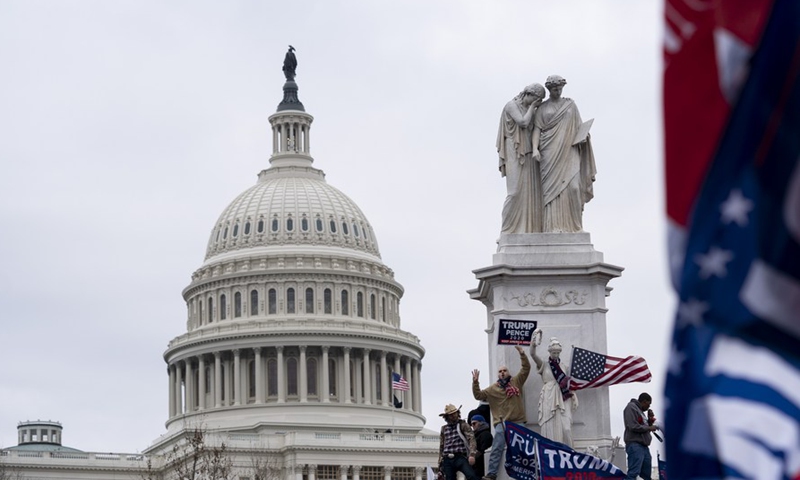
Supporters of U.S. President Donald Trump gather near the U.S. Capitol building in Washington, D.C., the United States, Jan. 6, 2021. (Xinhua/Liu Jie)
In an article entitled "American soft power will survive Donald Trump," Joseph Nye, who coined the term "soft power" in the late 1980s, argued that with Joe Biden in office, American resilience will once again lead to a recovery of the US soft power. Nye stressed the US has serious problems, but that "it also has a capacity for resilience and reform that has rescued us in the past."
American soft power has been eroded badly under Trump's presidency. In 2019, Gallup polled 134 countries and regions and found that only 30 percent of the polled held a favorable view of the US, a drop of almost 20 points since Barack Obama's presidency.
There are mainly two reasons for the decline of the US soft power. First, the Trump administration's governance has undermined the US democratic system, aggravated social conflicts and intensified political, economic and social crises in the US. Second, the US under Trump willfully withdrew from a string of international organizations and pacts, disregarded international rules and preached unilateralism and bullyism, which made other countries suffer a lot.
The past four years have witnessed declining confidence in the US leadership and US soft power around the world. These brazen US acts have brought about fundamental changes: All other countries including US allies are becoming more independent. They are all considering how to better safeguard their own national interests in a world without US leadership. Even if the US soft power can recover somewhat, the perceptions of these countries have altered.
Nye said the US has a capacity for resilience and reform which will help the US recover its attractiveness. But can the US capability for reform really lead to soft power recovery? Trump's four-year tenure has made us see the weakness of US reforms and governance. The US government has been unable to solve its domestic problems. In fact, various problems even have been intensified due to growing political polarization and partisan struggles.
There have been some voices in the US calling for reform over the past four years. But reform is stagnant. It's in fact not merely the fault of the Trump administration. It's the US deep political and social divisions that obstruct the reform's advancement.
Whether it is the turmoil in Capitol Hill, or the controversy surrounding the presidential elections, or Trump's highly controversial governance in the past four years, many observers believe that US democracy is already dead. It not only cannot avoid people like Trump to lead the country, it also has no way to fix the problems existing in the US society. This is an institutional crisis.
Even if the Biden administration comes to power and the transition is completed, what we will see will be a deepened rift within the US. It will cause more difficulties for Biden to govern the country in the future.
Nye wants those who mourn American democracy to understand that "the 2020 election saw an unprecedented turnout of voters who were able to unseat a demagogue." The problem is, the number of people who voted for Trump has also hit the record. The high level of political and social antagonism in the US is a systemic crisis. It is unrealistic to rely on a new administration to solve these problems.
After the Capitol riots, some countries have expressed their regret and many other countries have been very disappointed. They believe the riots have ripped off the fake mask of US democracy. The attractiveness of US democracy to other countries has been severely weakened.
The US democracy represented by these riots is very hypocritical. The US has a set of standards for itself, but when it turns to other countries' domestic problems, it has other standards. Therefore, many countries have recognized the true face of US democracy. Essentially, it serves the hegemony of the US. It's not a universal democratic system or standard that other countries need to admire. Therefore, the so-called beacon effect of US democracy is weakening and declining.
But regrettably, Nye and some other US elites are still trapped in the myth of US democracy. They still have blind faith in their democratic system. But in fact, such a kind of impractical mentality will not likely help them find the light at the end of a tunnel.
The mentality does not help resolve the problems of the US. At this time, it is more important to have profound reflections about the US democratic system's inherent problems. The US should have a humble and frank attitude and be more open to others' criticism. The US needs to seriously reflect on the root causes of its problems and propose some systematic reform plans.
The author is an assistant research fellow at the China Institute of International Studies. opinion@globaltimes.com.cn
